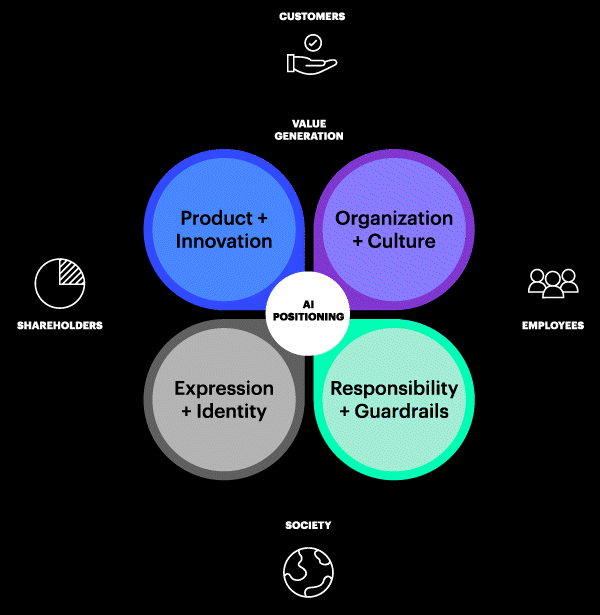BLOG
Positioning AI Brands With Better Brand Storytelling and a Sharp Value Proposition
For companies developing AI products and services, time is running out. Now is the time to clarify value and build trust.
It’s hard to keep up with the number of companies charging into artificial intelligence. But for those – particularly in the technology industry – that want to build market share in AI, finding ways to get ahead of the crowd is imperative. And time is of the essence. We are in a pivotal moment, and those who get it right will come out as the clear winners not only today but in the foreseeable future.
It’s not only about developing top products or services. To position themselves as category leaders, companies building AI capabilities need to think about telling a holistic story that evolves with the technology and customers’ uneven rate of AI adoption. Stakeholder perceptions are still being decided. Companies need to win talent wars, educate investors and soothe a society that is distrustful of AI.
The moment for throwing ideas into the market and seeing what sticks is over. Those who will lead in AI will be those who get their story right, and define these four key elements:
1. Product + Innovation
AI is driving the most significant technological platform shift in our lifetime. But with so many companies touting their advancements, there is a risk that new products get lost without the depth or differentiation needed to stand out in a fast-moving, crowded ecosystem.
Companies building AI products need to start with a better understanding of the user journey and experience. While the initial goals may have been building a superior product, customer centricity needs to move to center stage. That requires asking hard questions about the design and intentional experience for users. How will products solve customers’ biggest problems? How fast can they do it? How accurately? Interoperability is essential, too. Where does it fit in the ecosystem? Does it leave room for partnerships? All these things – not just the product itself – determine its value. Are all these facets articulated in a clear value proposition? Can that value be conveyed in messages that are neither too complex nor oversimplified?
“Short-term, brands will continue to tout the presence of AI broadly as a product differentiator,” says Danny Pomerantz, a senior manager at Prophet. “However, consumer understanding of the utility of AI will increase nearly as fast as the technology itself, so brands will soon need to include more in-depth explanation of the role AI plays in meeting customer needs.”
2. Organization + Culture
In the fierce war for AI talent, hiring and keeping the best people requires a distinctive Employee Value Proposition. This EVP must distill the company’s purpose, creating the North Star that unifies the whole company. Given the potential impact AI has on society, employees are taking caution and being intentional in evaluating an employer’s value system – this is especially true for Gen Z workers who place higher importance on a company’s values and purpose than older generations.
“To attract and retain talent that can build AI solutions, companies need to consider their WHY through the lens of all their stakeholders vs. a traditional overweighting and myopic focus on shareholder value. Other stakeholders include employees, the communities the enterprises operate in and serve, the customer of course, and society the planet,” says Tina Naser, senior partner and global practice lead in organization and culture.
The most in-demand AI workers will want to work for companies committed to performance excellence and innovation. That means companies must know how current workforce ecosystems must change. How will creative and content generation evolve? What skills are most urgently needed?
And they want to join companies that are committed to giving them room to grow, which may call for a refreshed organizational design. Employees, almost as much as customers, will become the catalyst for market positioning.
“The companies that best integrate AI with the human workforce will be the companies that attract and retain the best talent,” says Michael Lopez, partner in Prophet’s organization and culture practice. “That’s how they will unlock new levels of growth and performance.”
3. Expression + Identity
Too often, tech companies don’t think about branding until after a product is built. But the brand itself must be designed into the way AI products express themselves – how they look, sound and engage with users.
AI needs to be honest, quickly telling people that while these tools are helpful, they’re not human.
“The baseline expectation for AI-powered copy is transparency, disclosing that it’s AI immediately and not a person,” explains Darcy Munoz, Prophet’s verbal branding lead. And since they are often used in straightforward jobs-to-be-done roles, they should prioritize helpfulness over branding. “But personality, deployed thoughtfully and judiciously –an unexpectedly human phrase, the perfect emoji, a well-timed robot joke –goes a long way to build brand love.”
4. Responsibility + Guardrails
The mistrust of AI is widespread. That means that even as companies race to build growth-driving technology and value for stakeholders and customers, they must position themselves – and all their AI offers – as responsible, carefully weighing the impact on society. The potential threats are grave, including the “risk of extinction.” That’s why 350 AI executives, researchers, and engineers signed a statement released by the Center for AI Safety.
To manage potential concerns companies must be clear on their mission and upfront in promises to ethically contribute to managing AI. They must work with governments, competitors and concerned consumer groups, ensuring safeguards are constantly evolving for greater effectiveness.
This visible commitment is especially important for reaching younger people, both as employees and customers. They are fierce in their commitment to working for inclusive companies that stand for making the world a better place.
“Gen Z will be paying careful attention to which companies are at the forefront of responsible AI and which companies are lagging,” says Michael Lau, a strategy associate at Prophet and demographic expert.
Amid the intense scrutiny of the business media, Wall Street, Washington D.C. and the general public, companies must honestly acknowledge their reputation. Samsung, Amazon and Apple are among the most trusted tech companies. TikTok and Meta score lowest.
Tell a Sharper Story
Companies that carefully consider all four elements have the raw materials to tell a powerful story and establish a unique identity. The next step is prioritizing who they want to hear that story and crafting narratives designed explicitly for core audiences. For some tech companies, AI is the headline. For others, it might be a chapter. But all must draw from a unified positioning strategy. That’s the foundation that aligns vision, solidifies ambition and articulates the pillars for messaging.
Consider these four stakeholders:

Customers: Educate customers to earn trust.
Many recognize AI’s benefits of conveniences, yet a recent study showed that 76% of consumers are concerned over the risk of misinformation. Prophet’s recent test of AI messaging with B2B customers found that without more explanation, mentioning AI didn’t help. It came across as vague and expected but without much distinction or value. That underscores the importance of communicating the customer value proposition using clear and compelling differentiation.
Employees: Use corporate purpose to recruit, engage and retain employees.
While coming off a year of layoffs, the tech industry is still desperate for AI-skilled engineers and talent. Amazon, Microsoft, Meta, Nvidia, Tesla, Google, and many fast-moving start-ups have announced stepped-up investments in AI. As a result, they are refreshing their enterprise value proposition, each aiming to develop a unifying rally cry that sets them apart.
Shareholders: Deepen messages for shareholders.
While many companies have been using AI for decades, the launch of ChatGPT last year was seismic. The AI fervor drew intense investor interest, often with little understanding. Executives tossed out vague AI mentions on earnings calls, often with little explanation. But it’s important to manage expectations amid the hype as savvy market investors search for strategy, differentiation and growth drivers. AI companies must help potential investors find those differences with clear messages that cut through the noise.
Society: Commit to the responsible use of AI.
Historical context matters here. In the early days of social media, many believed technology tended toward the beneficial. Now that society has seen its ugly side there’s a high level of distrust and even contempt. And it’s important to note that even the most sophisticated AI thinkers still have no idea where AI will take us. AI is not a business-as-usual business. It will require exceptional efforts to earn and manage the public’s trust.
FINAL THOUGHTS
Technology, media, entertainment, and telecommunications companies that offer AI products and services need to tell a compelling story. Product innovation alone is not enough to capture the market. Companies must articulate their identity, add value and provide guardrails to build and retain customers. Finding the right balance between simplicity and complexity will be critical as will moving fast and not missing the moment. Contact our team today to position your AI brand for success.
